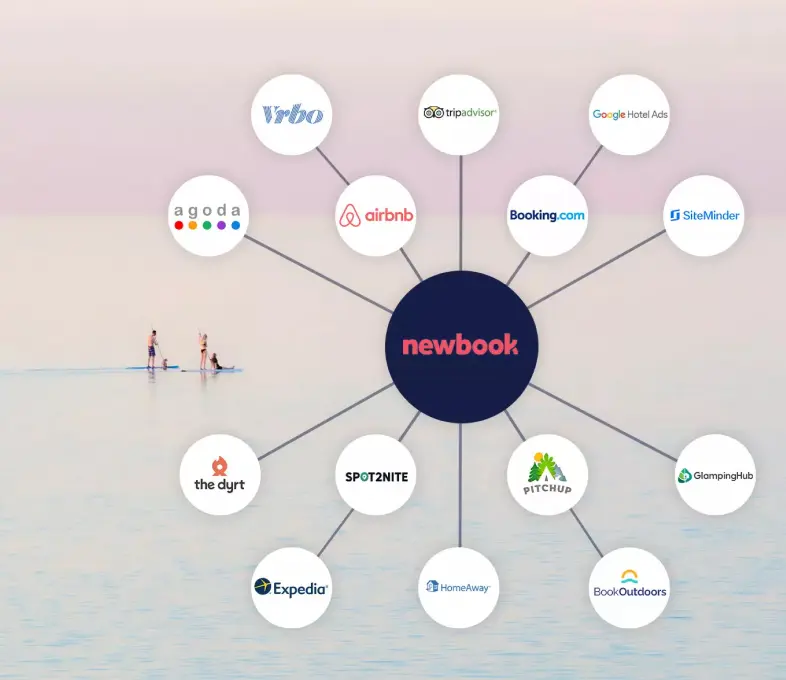So, you’ve got a dreamy little property (or maybe just a spare room with good lighting and passable Wi-Fi) and you’re thinking, “Hey, why not turn this into an Airbnb?”
Smart move.
At first, it seems easy enough. Make a listing, set a price, and wait for the bookings…
…until you’re knee-deep in laundry, juggling triple bookings, and trying to decode a service fee breakdown that might as well be written in Latin.
Before you throw in the towel (or fold it for yet another checkout), know that you don’t have to do it all yourself. Vacation rental management services can make hosting way less hectic.
They handle guest communication, coordinate cleanings, restock essentials, manage your calendar, optimize your pricing, and even deal with reviews. Some will even set up your listing, take professional photos, and write the description so it sounds more like a “cozy boho retreat” and less like a “small room with bed.”
But is an Airbnb rental management company worth the cut they take? What exactly do they do? And how much of your precious profit are they pocketing?
Don’t worry. In this guide, we’re breaking it all down for you, so you can figure out if handing over the keys (and some cash) to an Airbnb rental management service is the right move.
Airbnb Rental Property Management: Who Needs It and Why
Airbnb rental property management is a service that steps in to run the day-to-day operations of your listing. This includes guest communication, cleanings, pricing, reviews, maintenance coordination—basically everything you need to start and maintain an Airbnb.
Whether you’re juggling a full-time job, live across the country from your rental, or just want to earn passive income and keep your peace of mind, property management can be a lifesaver.
Owner Profiles: From Passive Investors to Time-Strapped Hosts
Airbnb short-term rental management caters to a wide range of host types:
- The passive investor: You’re in it for the ROI, not the replies. You want someone else to deal with guest logistics while you focus on growing your portfolio (or just enjoying brunch in peace).
- The busy professional: Between meetings, kids, and remembering to drink water, you don’t have the time (or patience) to schedule cleanings or price-match competing listings. You need support, not another job.
- The long-distance host: Your property’s in a dream location. You? Not so much. If you’re not local enough to drop off extra towels or handle lockouts, a management service can be your eyes, ears, and emergency contact.
- The burnt-out host: You tried the DIY route, and now you’re one cranky review away from throwing in the towel. A manager can take over the heavy lifting and help bring your listing (and your enthusiasm) back to life.
Common Challenges Management Solves: Time, Guest Issues, and Quality Control
Rental management solves the problems that make hosting feel like a second full-time job. These common challenges include:
- Time drain: Between answering inquiries, syncing calendars, arranging cleanings, and chasing down reviews, self-managing eats up more hours than most hosts expect. A good manager handles all that and more, so you can actually enjoy your income without losing your weekends.
- Guest questions and complaints: From lost keys to mystery noises to “This isn’t what I expected” meltdowns, guest issues are inevitable. Professional managers know how to de-escalate, resolve problems fast, and keep your ratings from crashing.
- Quality slip-ups: Inconsistent cleanings, forgettable guest experiences, and lack of clear check-in instructions are just a few examples of how bad reviews happen. Management services ensure your property stays spotless, stocked, and five-star ready every time. It’s their job to keep standards high, even when you’re not around to double-check.
More bookings, more often with our built in channel manager
Newbook is your all in one property management software. Talk to us today to learn how you can inprove operations and increase bookings for your business.


Management Models and Services

Not every Airbnb host needs the same level of support, and luckily, there are different management models to match.
Some hosts prefer to stay hands-on and just need help with a few time-consuming tasks, while others want a more hands-off approach and are happy to let a professional manage the details.
Let’s look at the different Airbnb rental management models.
DIY, Hybrid, and Full-Service Models
- DIY (Do It Yourself): You’re the one-person show. You create the listing, set the price, coordinate cleanings, respond to guests, and troubleshoot when someone can’t figure out the thermostat. It’s cost-effective but time-consuming. This model is best suited to people who live nearby and don’t mind staying very involved.
- Hybrid: You handle some parts, and a third party handles the rest. Maybe you love writing your listing and managing your pricing but outsource cleaning and guest messaging. This model gives you flexibility and control while lightening the load.
- Full-Service: You’re out of the equation. A management company takes over everything, including photos, pricing, messaging, cleanings, maintenance, guest reviews, and more. You pay a cut but you also get your evenings and weekends back. This is great for remote owners, multiple-property investors, or anyone who’d rather not handle the day-to-day responsibilities of hosting.
| Feature | DIY | Hybrid | Full-Service |
| Guest Communication | You handle all messaging | Shared (you or a service handles it) | The management company handles it |
| Cleaning Coordination | You schedule and manage | Outsourced to cleaners or services | Fully managed by the company |
| Pricing Optimization | Manual or basic tools | You or partial automation | Dynamic pricing included |
| Listing Creation & Updates | You manage it | You or external help | Created, maintained, and optimized |
| Maintenance Requests | You coordinate everything | You or outsourced | Included and monitored by team |
| Revenue Share or Fee | No fee (except platform costs) | Pay for specific services as needed | Typically 20–40% of rental income |
| Time Commitment | High | Moderate | Low |
| Level of Control | Full | Moderate | Minimal |
| Best For | Local, hands-on hosts | Part-time or semi-involved hosts | Remote owners or passive investors |
Airbnb Short-Term Rental Management vs. Long-Term Models
Short-term rentals and long-term rentals might seem similar on the surface (it’s all rent, right?), but they operate in completely different ways.
And depending on your goals, one model may be way more your speed than the other. Here’s how the two compare in the real world.
Operational differences between short-term and long-term Airbnb rental management services:
- Turnovers: In short-term rentals, turnovers happen constantly. You’ll need to clean, restock, and prep the property after nearly every stay, which could mean multiple times a week during peak season. It’s a high-frequency, high-maintenance setup. In contrast, long-term rentals only require turnover between leases, usually once or twice a year. So, day-to-day involvement is minimal.
- Guest communication & support: In short-term rental property management, hosts take on more guest communication. You’ll be expected to respond quickly to questions about Wi-Fi, appliances, check-in details, or local recommendations. It’s similar to running a mini hotel. With long-term tenants, communication is infrequent and usually limited to maintenance requests, lease renewals, or the occasional late rent notice.
- Pricing strategy: Short-term rental rates are dynamic, often adjusted daily based on demand, seasonality, local events, and competitor pricing. Many hosts use automated tools or rely on management companies to stay competitive. Long-term rental pricing, however, is typically fixed for the duration of a lease and only reviewed once a year or at the end of the agreement.
When comparing short–term Airbnb rental management to long-term models, it’s also important to consider revenue potential and operational complexity.
Short-term rentals can generate significantly more income per night, but you’ll work harder for it. With high turnover comes higher maintenance costs, more guest interaction, and tighter operations.
Long-term rentals are lower maintenance and more stable, but you won’t see those big weekend premiums or surge pricing benefits. But that predictability is often what attracts some Airbnb hosts.
Airbnb Vacation Rental Management Services: What’s Typically Included
Wondering what exactly these management companies do for their cut? Here’s what a solid vacation rental management service usually covers:
- Listing optimization: They create polished, well-structured listings that highlight your property’s strengths. This often includes professional photography, keyword-rich descriptions, and adjustments to improve visibility in search results.
- Cleaning coordination: A reliable Airbnb management service ensures cleanings are handled consistently between stays. They work with trusted cleaning crews, inspect the work, and make sure the property is fully reset and guest-ready each time.
- 24/7 guest support: Middle-of-the-night lockout? Confused guest? “The shower’s making a weird noise?” Whether it’s a late-night check-in question or help with appliances, the management team handles guest inquiries around the clock, so you don’t have to stay glued to your phone.
- Smart lock integration: Many companies install and manage smart locks. This makes check-ins seamless for guests and reduces the need for in-person key handoffs. Entry codes are reset automatically after each stay for added security.
- Local compliance: A good manager stays up to date with local regulations and ensures your property meets all legal requirements, including permits, taxes, and short-term rental laws. This helps prevent unexpected fines or interruptions.
eBook: 5 Powerful Ways to Use Automated SMS
“We made an additional $7000 in one month by using SMS Late Check-Outs.” Find out how you can too!


Airbnb Rental Property Management Service: In-House vs Outsourced
Now for the big question. Should you manage your rental property yourself with a handful of handy tools or outsource the whole operation to the pros?
Pros And Cons Of In-House Airbnb Rental Property Management
Pros:
- Lower costs (no commission to pay)
- Full control over guest experience and pricing
- Flexibility to experiment and adjust quickly
Cons:
- Time-intensive and mentally draining
- Requires juggling multiple tools for messaging, pricing, cleaning, etc.
- No backup if something goes wrong while you’re on vacation
Pros And Cons Of Outsourcing Airbnb Rental Property Management
Pros:
- Hands-off experience—perfect for scaling or remote hosting
- Access to industry tools, local teams, and expert knowledge
- Higher consistency, faster guest response times, fewer headaches
Cons:
- Can cost 20–40% of your revenue
- Less control over how things are run day-to-day
- Quality can vary depending on the company
Choosing the Right Airbnb Rental Management Company
Hiring a rental management company is a big decision. You’re trusting someone to handle your property, represent your brand, and communicate with your guests.
Let’s discuss how to make the right decision and ensure your property—and your peace of mind—are in good hands.
What to Look for in an Airbnb Rental Management Company
When evaluating potential partners, you want an Airbnb vacation rental management company that brings the right mix of professionalism, local insight, and tech-savvy operations to the table.
Here’s what to look for:
- Experience: Look for a company that has experience managing short-term rentals, ideally in your market. They should understand occupancy patterns, pricing fluctuations, and what local guests expect. Ask how many listings they currently manage and how long they’ve been in the business.
- Tech stack: Strong tech = smoother operations. The company should use modern tools for dynamic pricing, calendar syncing, automated guest messaging, cleaning coordination, and review tracking. Bonus points if you get access to a dashboard with real-time reporting
- Local presence: A management company with boots on the ground is better equipped to handle last-minute issues, inspect cleanings, and maintain consistent property standards. National or fully remote services may lack that level of attention.
- Pricing model: Some companies take a percentage of your revenue (usually 20–40%). Others charge a flat monthly fee or offer tiered packages. Be sure to understand what’s included and what costs extra. Things like restocking supplies or handling maintenance calls can add up fast.
- Transparency: You shouldn’t have to guess how your listing is performing. Look for a company that offers clear communication, regular updates, and performance metrics. Hidden fees or vague service agreements are a red flag.
Smart questions to ask before you commit to an Airbnb rental property management service:
- What’s included in your base rate, and what costs extra?
- How do you handle guest issues or negative reviews?
- How do you optimize pricing for my property?
- Can I access performance reports or dashboards?
- How many properties does each manager handle at once?
- What is your cancellation or termination policy?
Top Qualities of Airbnb Vacation Rental Management Companies
At the core, great Airbnb managers care about two things: protecting your property and enhancing the guest experience.
And it’s the guest experience that really drives your success. Repeat bookings, five-star reviews, and fewer issues all start with how you treat your guests.
The best property management services have these key qualities:
- Guest experience as a core metric: Great managers treat every stay like it’s an opportunity to earn a five-star review. That means fast communication, smooth check-in and check-out processes, clean and fully stocked spaces, and thoughtful touches that leave a lasting impression.
- Reputation and review management: Reputation management is built into how top companies operate. That includes automated follow-ups for reviews, professional responses to complaints, and ongoing analysis of guest feedback to identify areas for improvement.
- Consistency across properties: Well-rated companies standardize their processes across every property they manage, from cleaning and inspections to pricing adjustments and guest messaging. That level of consistency builds trust with guests and keeps operations running smoothly.
So, what are some examples of rental management companies with these great qualities? Let’s go over a few:
- Evolve Vacation Rental: Evolve is a well-known name in the industry. They’ll handle marketing, guest communication, and booking support, but you’re still responsible for cleanings and maintenance. It’s a lighter-touch option if you want some help without fully handing off your property.
- SkyRun Vacation Rentals: SkyRun operates in various U.S. markets and offers full-service vacation rental management with a local, franchise-based model. That means each location is run by people who live and work in the area. So, they bring hands-on experience to operations like cleaning, guest services, and maintenance.
- Houst: If you want to be completely hands-off, Houst might appeal to you. They’ll manage your listing, guests, and operations entirely. But again, you’re giving up control and paying for it.
- Peak Season: Peak Season focuses on transforming underperforming vacation rentals into high-earning properties. Their team handles everything from design upgrades and photography to full-service Airbnb management. For example, they’ve helped increase annual revenue on individual listings from $40,000 to $150,000 by revamping the space and applying what they call “The Peak Method.”
Cost & ROI Considerations

While the promise of “hands-free income” sounds great, the fees can add up quickly, and not every service delivers the same return on investment.
Before you sign anything, it’s worth understanding how pricing works and whether the cost actually makes sense for your vacation rental business.
Airbnb Rental Management Fees: What Do They Really Cost?
Let’s talk numbers.
Vacation rental management fees typically fall somewhere between 10% and 50% of your total booking income. This depends on how hands-on or hands-off you want to be.
Here are the most common fee structures you’ll come across:
- Percentage of revenue: This is the most common model. The company takes a percentage of your booking income, usually 25–30%. However, premium services with high-touch guest experiences may push closer to 40–50%. The more tasks they handle (cleaning, pricing, maintenance, communication), the higher the rate.
- Flat rate: Some managers offer a fixed monthly fee instead of a percentage. This can be more predictable, but you’ll want to be sure it still makes sense during off-peak months or when your booking volume drops.
- À la carte: In this model, services are split out. You might pay separately for guest communication, cleaning coordination, listing optimization, etc. While this gives you flexibility, it also makes the math trickier and the invoices longer.
Airbnb Management Fee Structures at a Glance
| Fee Structure | How it Works | Pros | Cons |
| Percentage of Revenue | The manager takes a cut of your gross rental income (typically 25–30%) | Scales with performance, easy to calculate | High cost if your property earns more |
| Flat Rate | Set a monthly fee regardless of how many bookings you have | Predictable cost, good for high-volume or consistent bookings | Can feel expensive during off-peak or low-occupancy months |
| À La Carte | Pay separately for specific services (cleaning, messaging, pricing, etc.) | Full control over what you pay for, flexible | Costs can add up quickly, inconsistent service quality |
So, those are the headline rates. But they don’t always tell the full story.
Many management companies include extra fees that aren’t clearly advertised upfront. These add-ons can quietly cut into your profits if you’re not paying attention:
- Cleaning markup: Some managers charge guests a cleaning fee and keep a portion of it after paying the cleaner.
- Maintenance add-ons: Even small repairs can come with additional labor or coordination fees.
- Onboarding/setup fees: Services like listing creation, photography, or system integration might be charged separately when you first sign on.
- Cancellation or termination penalties: Some companies require a minimum contract term or charge a fee if you end the agreement early.
When talking fees, you can and should ask about flexibility. Some companies will lower their percentage if you have multiple properties or agree to a longer contract.
They might also remove certain fees if you’re willing to manage a few tasks yourself. Don’t be afraid to ask what’s negotiable.
Is It Worth It? Evaluating ROI on Airbnb Rental Management
A management company takes a percentage of your income. So, it’s only fair to ask whether you’re getting enough back in return to justify the cost.
The answer depends on two key factors: (1) How much time you’re spending vs. how much you’re earning, and (2) What kind of guest experience you’re delivering with and without help.
Between bookings, guest messages, cleaning coordination, pricing adjustments, and maintenance issues, you’re likely putting in hours every week, especially if your calendar is full.
If a professional manager can take those tasks off your plate and keep your property performing well (or even better than before), the trade-off may be worth the cost. This is especially true for hosts juggling multiple listings, remote properties, or another full-time job.
Guest satisfaction and reviews should also factor into the ROI of Airbnb rental management. Your reviews drive your visibility, booking rates, and nightly pricing. When guests don’t have a great experience, whether due to delayed check-ins, slow responses, or messy spaces, it shows up in your ratings.
Good management companies have systems in place to prevent that. They standardize cleaning, respond quickly to guests, handle issues before they become problems, and follow up after check-out. Many Airbnb hosts see an increase in review scores once they hand things over, sometimes even moving from 4.6 to 4.9 stars over a few months.
Higher ratings improve your ranking in Airbnb search results, attract better guests, and allow you to charge more per night. That bump in both occupancy and rate can quickly offset the cost of management services.
The takeaway: If you’re already running a tight, well-reviewed operation and don’t mind the hands-on work, a full-service manager might not be necessary. But if you’re short on time, struggling to keep up, or seeing dips in guest satisfaction, investing in a professional could lead to more consistent income and far fewer headaches.
Conclusion
Of course, there are benefits and trade-offs of outsourcing Airbnb property management.
Hiring a company to take care of the details can save time and improve guest experience, but it comes at a cost, and you give up a level of control.
Managing it all yourself gives you freedom and a higher cut of your rental revenue, but it also demands consistency, attention, and a lot of behind-the-scenes work.
Your decision will likely come down to your priorities, whether that’s time, control, profit, peace of mind, or a combination of all four.
And if you’re not ready to hand over the keys but still want to streamline your operations, consider using a property management system (PMS). Newbook helps you simplify bookings, guest communication, housekeeping schedules, and reporting, all from one platform.
Schedule a demo today and explore how Newbook can support your Airbnb on your terms.
Your all-in-one, online booking system
Newbook is your all in one online booking system. Talk to us today to learn how you can improve operations and increase booking for your business.



